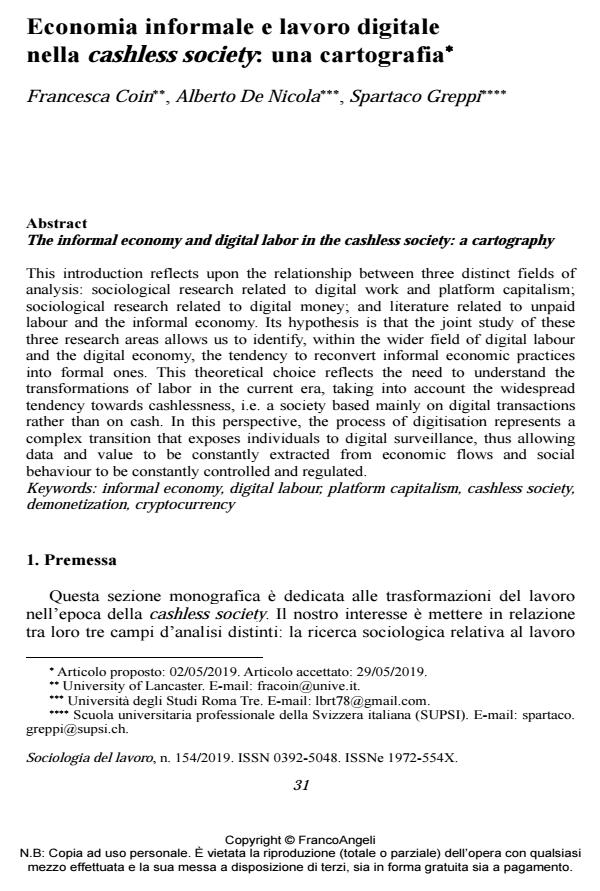The informal economy and digital labor in the cashless society: a cartography
Journal title SOCIOLOGIA DEL LAVORO
Author/s Francesca Coin, Alberto De Nicola, Spartaco Greppi
Publishing Year 2019 Issue 2019/154 Language Italian
Pages 13 P. 31-43 File size 169 KB
DOI 10.3280/SL2019-154002
DOI is like a bar code for intellectual property: to have more infomation
click here
Below, you can see the article first page
If you want to buy this article in PDF format, you can do it, following the instructions to buy download credits

FrancoAngeli is member of Publishers International Linking Association, Inc (PILA), a not-for-profit association which run the CrossRef service enabling links to and from online scholarly content.
This introduction reflects upon the relationship between three distinct fields of analysis: sociological research related to digital work and platform capitalism; sociological research related to digital money; and literature related to unpaid labour and the informal economy. Its hypothesis is that the joint study of these three research areas allows us to identify, within the wider field of digital labour and the digital economy, the tendency to reconvert informal economic practices into formal ones. This theoretical choice reflects the need to understand the transformations of labor in the current era, taking into account the widespread tendency towards cashlessness, i.e. a society based mainly on digital transactions rather than on cash. In this perspective, the process of digitisation represents a complex transition that exposes individuals to digital surveillance, thus allowing data and value to be constantly extracted from economic flows and social behaviour to be constantly controlled and regulated.
Al centro di questa lettura introduttiva c’è la relazione fra tre campi d’analisi distinti: la ricerca sociologica relativa al lavoro digitale e il capitalismo delle piattaforme; la ricerca sociologica relativa alla moneta digitale e la letteratura riguardante il lavoro gratuito e l’economia informale. L’ipotesi è che lo studio congiunto di questi tre settori di ricerca consenta di riconoscere all’interno del più ampio campo della "digitalizzazione" del lavoro e dell’economia, la tendenza alla riconversione di pratiche economiche informali. Questa scelta teorica rimanda alla necessità di comprendere le trasformazioni del lavoro tenendo conto della tendenza diffusa a muovere verso una cashless society, ovvero una società fondata prevalentemente sulle transazioni digitali anziché sul contante. Questo processo di digitalizzazione espone i singoli a una vigilanza digitale che da un lato consente di estrarre dati e valore dai flussi economici e dall’altro permette di controllare e disciplinare i comportamenti dei soggetti che vi prendono parte.
Keywords: Informal economy, digital labour, platform capitalism, cashless society, demonetization, cryptocurrency
- Armano E., Murgia A., Teli M. (2017). Platform capitalism e confini del lavoro negli spazi digitali. Milano-Udine: Mimesis.
- Banfield E.C. (1970). The unheavenly city: The nature and future of our urban crisis. Boston: Little, Brown and Company.
- Bech M.L., Faruqui U., Ougaard F., Picillo C. (2018). Payments are A-Changin’ But Cash Still Rules. BIS Quarterly Review. -- Available at SSRN: https://ssrn.com/abstract=3139217.
- Beck U. (2000). Il lavoro nell’epoca della fine del lavoro: tramonto delle sicurezze e nuovo impegno civile. Torino: Einaudi.
- Castel R. (2007). La metamorfosi della questione sociale. Una cronaca del salariato. Avellino: Sellino Editore.
- Consumer Financial Protection Bureau (2016). Who are the credit invisible? How to help people with limited credit histories. -- Text available at the web site: https://s3.amazonaws.com/files.consumerfinance.gov/f/documents/201612_cfpb_credit_invisible_policy_report.pdf. Accessed May 24, 2019.
- Foroohar R. (2019). The Fed has exacerbated America’s new housing bubble. Financial Times. -- Text available at the web site: www.ft.com/content/219aaa52-4675-11e9-b168-96a37d002cd3. Accessed May 24, 2019.
- Gerxhani K. (2004). The informal sector in developed and less developed countries: a literature survey. Public choice, 120 (3-4): 267-300.
- Gough I., Wood G. (2004). Insecurity and welfare regimes in Asia, Africa and Latin America: Social policy in development contexts. Cambridge: Cambridge University Press.
- Hart K. (1973). Informal income opportunities and urban employment in Ghana. The journal of modern African studies, 11 (1): 61-89.
- Marazzi C. (2002). Capitale & Linguaggio. Roma: DeriveApprodi.
- McWilliams D. (2019). Quantitative easing was the father of millennial socialism. Financial Times. -- Text available at the web site: www.ft.com/content/cbed81fc-3b56-11e9-9988-28303f70fcff. Accessed May 24, 2019.
- Popper N., Isaac M. (2019). Facebook and Telegram Are Hoping to Succeed Where Bitcoin Failed. The New York Times. -- Text available at the web site: www.nytimes.com/2019/02/28/technology/cryptocurrency-facebook-telegram.html. Accessed May 24, 2019.
- Portes A., Haller W. (2005). The informal economy. In: Smelser N.J., Swedberg R., eds., Handbook of Economic Sociology. New York: Russell Sage Foundation.
- Rogoff K.S. (2016). The Curse of Cash. Princeton: Princeton University Press.
- Sassen S. (2015). Espulsioni. Brutalità e complessità nell’economia globale. Bologna: il Mulino.
- Schneider F., Enste D. (2002). The Shadow Economy: Theoretical Approaches, Empirical Studies, and Political Implications. Cambridge (UK): Cambridge University Press.
- Schor J.B., Attwood‐Charles W. (2017). The “sharing” economy: labor, inequality, and social connection on for‐profit platforms. Sociology Compass, 11(8): 1-16.
- Srnicek N. (2016). Platform Capitalism. Cambridge: Polity.
- Summers L.H. (2016). The Age of Secular Stagnation: What It Is and What to Do About It. Foreign Affairs. -- Text available at the web site: www.foreignaffairs.comarticles/united-states/2016-02-15/age-secular-stagnation. Accessed May 24, 2019.
- Tett G. (2019). Why the world is awash with S 100 bills. Financial Times Magazine. -- Text available at the web site: www.ft.com/content/4caa021c-3f9d-11e9-9bee-efab61506f44. Accessed May 24, 2019.
- The Economist (2016). Bringing light to the grey economy. -- Text available at the web site: www.economist.com/international/2016/10/15/bringing-light-to-the-grey-economy. Accessed May 24, 2019.
- Zelizer V.A. (1997). The social meaning of money: pin money, paychecks, poor relief, and other currencies. Princeton: Princeton University Press.
Francesca Coin, Alberto De Nicola, Spartaco Greppi, Economia informale e lavoro digitale nella cashless society: una cartografia in "SOCIOLOGIA DEL LAVORO " 154/2019, pp 31-43, DOI: 10.3280/SL2019-154002